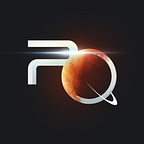The Birth of a Universe: The Forest Planet Reveal
Our planets are at the very heart of PlanetQuest and continue to be at the forefront of our vision to push the boundaries of player ownership and NFTs. As mentioned in one of our previous Medium articles, our in-house Genesis Engine harnesses procedural technology to generate planets which span across various classes. However, it was not just the seemingly impossible assignment of creating galaxies full of 3D planets which generate directly in a browser, but also the creative direction which is ingrained within each and every planet that was an enormous challenge.
We are creating a reality better than reality — PlanetQuest Design Principles
This is our mission here at PlanetQuest, under the vision of Art Director — Jon McCoy, who has been featured in some of Hollywood’s most coveted feature films including, Star Wars: Rogue One, Blade Runner 2049, Avengers: Age of Ultron to name a few.
Behind all of this, our inspiration for PlanetQuest originated from our combined love for science fiction. Concepts like intergalactic warfare, extra-terrestrial life forms, speculative technologies and more have all been embedded into our larger universe. Additionally, our strong belief in adhering to physical planetary properties also reinforces our confidence in the Genesis Engine to even double as an educational tool for future generations as space becomes a growing area of interest.
We want to imbue our memories of seeing all the old school matte paintings that would appear in films like Star Wars and our desire to reconnect with that spirit of science fiction. Approaching alien worlds in a cinematic and story driven way, each of our planet classes was carefully constructed to capture the frightening elegance of the natural elements. This uniqueness is combined with variations and configurations of the base class which distinguish themselves from other planets and also provide a perfect environment for exploration through procedural randomization. Additionally, each planet’s natural formations are complemented by the remnants of advanced alien civilizations, reminiscent of historical landmarks not limited to Egyptian ruins and 19th century Oriental temples. Coupled with this, each planet class has its own variation of flora and fauna that were forced to adapt to environmental harshness to survive. These modifications, almost akin to evolution, exist throughout PlanetQuest waiting to be awoken and discovered by the Explorers.
Today, we will be revealing a new planet class that draws distinct natural elements from our own home — The Forest Planet.
This planet captures the familiarity of woodlands yet feels distinctly foreign in its remnants of ruins and looming overgrowth. Venturing deeper, Explorers may experience rumbles of waterfalls against rocks aged by years of weathering and erosion. There is an air of uncertainty with human instincts hesitating between the cusp of discovery hidden by thickening ranges of forestry. God-like redwood trees constricted by overgrown vines grant an almost omniscient protection from creatures which haven’t seen the light of day. Here, creatures are also forced to thrive under large canopies, metamorphosing to the serene harshness from the lack of light and shadows threatening their path. The Forest Planet holds secrets in its markings on trees and gaps of darkness waiting to be unveiled by chosen Explorers.
The Genesis Engine — A fictional reality brought to life.
Each of our planets follows fundamental laws of physics akin to the ones on our world. Each planet, like our own, adheres to Rayleigh Scattering, a phenomena explaining the scattering of light waves when entering an atmosphere and its subsequent effects on perceived color. As light oscillates and excites smaller atmospheric molecules it scatters in a multi-directional pattern emitting a different color based on the wavelength of the light. Furthermore, planets and their moons have differences in relative positioning and orbit speed based on their mass and thus gravitational pull.
Aligning with both science fiction and principles of physics our Genesis Engine intentionally respects laws of physics both as an educational tool but also masks a more humbling truth. We are at the mercy of the elements. Our curiosity in the face of space unknown has now given birth to a scientific mandate: understand the stars and the rules governing all that is between them. It is now more apparent that we survive through what we understand, and we understand through what we explore.
Strap in, Explorers.
More planet reveals to come at planetquest.io.
